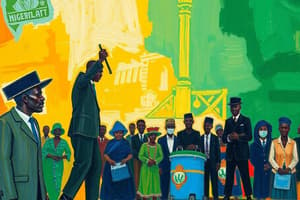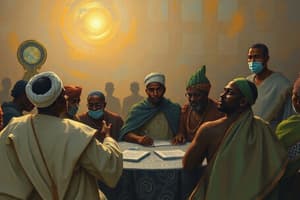Podcast
Questions and Answers
Nigeria has transitioned to democracy without any obstacles from authoritarian military governments.
Nigeria has transitioned to democracy without any obstacles from authoritarian military governments.
False (B)
Large sums of national resources have been saved during Nigeria's transition to democracy.
Large sums of national resources have been saved during Nigeria's transition to democracy.
False (B)
Political violence and thuggery have not resulted in loss of lives and properties in Nigeria.
Political violence and thuggery have not resulted in loss of lives and properties in Nigeria.
False (B)
The military has never been in power in Nigeria since independence in 1960.
The military has never been in power in Nigeria since independence in 1960.
No democratic administrations in Nigeria have been terminated by military coups since independence in 1960.
No democratic administrations in Nigeria have been terminated by military coups since independence in 1960.
The conduct of Nigerian politicians has always been exemplary.
The conduct of Nigerian politicians has always been exemplary.
The second republic in Nigeria was successful and did not have any problems.
The second republic in Nigeria was successful and did not have any problems.
Military coups in Nigeria have not had a significant impact on civilian regimes.
Military coups in Nigeria have not had a significant impact on civilian regimes.
General Abacha ruled Nigeria for ten years.
General Abacha ruled Nigeria for ten years.
General Babangida succeeded General Abacha.
General Babangida succeeded General Abacha.
Olusegun Obasanjo was a former military Head of State.
Olusegun Obasanjo was a former military Head of State.
General Abubakar handed over power to a military President.
General Abubakar handed over power to a military President.
The period between 1983 and 1999 was described as the 'years of hope' for Nigeria.
The period between 1983 and 1999 was described as the 'years of hope' for Nigeria.
General Abacha employed instruments of peace and unity to rule Nigeria.
General Abacha employed instruments of peace and unity to rule Nigeria.
The transition programme under General Babangida's regime was successful.
The transition programme under General Babangida's regime was successful.
The Nigerian citizenry were in favor of continued military rule in 1999.
The Nigerian citizenry were in favor of continued military rule in 1999.
The NPN party won the 1983 general elections in Nigeria with a landslide victory.
The NPN party won the 1983 general elections in Nigeria with a landslide victory.
The KANU party ruled Kenya for nearly 40 years.
The KANU party ruled Kenya for nearly 40 years.
The Gabonese Democratic Party (PGD) lost power in 1990.
The Gabonese Democratic Party (PGD) lost power in 1990.
The Rally of Togolese People (RTP) has been in power for 20 years.
The Rally of Togolese People (RTP) has been in power for 20 years.
The use of incumbency power by political parties in Africa is a positive factor for democratic experiments.
The use of incumbency power by political parties in Africa is a positive factor for democratic experiments.
The civilian government of the second republic in Nigeria was overthrown by a military coup in 1982.
The civilian government of the second republic in Nigeria was overthrown by a military coup in 1982.
The President of Togo, Gyasimgbe Eyadema, had not 'pocketed' the military.
The President of Togo, Gyasimgbe Eyadema, had not 'pocketed' the military.
The 1983 general elections in Nigeria were free and fair.
The 1983 general elections in Nigeria were free and fair.
Nigeria was colonized by France.
Nigeria was colonized by France.
The Nigerian political system is very stable.
The Nigerian political system is very stable.
The Nigerian First Republic lasted from 1960 to 1970.
The Nigerian First Republic lasted from 1960 to 1970.
The British rule in Nigeria lasted for 100 years.
The British rule in Nigeria lasted for 100 years.
The Nigerian elite worked together harmoniously during the transition to independence.
The Nigerian elite worked together harmoniously during the transition to independence.
The Nigerian system of government inherited from the British is a unitary system.
The Nigerian system of government inherited from the British is a unitary system.
The politicians of the 1960s were known for their honesty and integrity.
The politicians of the 1960s were known for their honesty and integrity.
The regions were less powerful than the center in the Nigerian system of government inherited from the British.
The regions were less powerful than the center in the Nigerian system of government inherited from the British.
For a democracy to be considered consolidated, no significant political group should attempt to overthrow the democratic regime or secede from the state.
For a democracy to be considered consolidated, no significant political group should attempt to overthrow the democratic regime or secede from the state.
In a consolidated democracy, political actors are habituated to resolving political conflicts through violence.
In a consolidated democracy, political actors are habituated to resolving political conflicts through violence.
A consolidated democracy is only possible when a country is facing severe political and economic crises.
A consolidated democracy is only possible when a country is facing severe political and economic crises.
In a consolidated democracy, violations of established norms are tolerated and do not result in any consequences.
In a consolidated democracy, violations of established norms are tolerated and do not result in any consequences.
A consolidated democracy is only achieved when all citizens agree on a single viewpoint.
A consolidated democracy is only achieved when all citizens agree on a single viewpoint.
In a consolidated democracy, democracy is not routinized and deeply internalized in every aspect of social, institutional, and psychological life.
In a consolidated democracy, democracy is not routinized and deeply internalized in every aspect of social, institutional, and psychological life.
The concept of 'arenas' in a consolidated democratic set-up refers to separate but mutually conflicting conditions.
The concept of 'arenas' in a consolidated democratic set-up refers to separate but mutually conflicting conditions.
A consolidated democracy can exist without a virile and free civil society.
A consolidated democracy can exist without a virile and free civil society.
Flashcards
Colonial Legacy in Nigeria
Colonial Legacy in Nigeria
The impact of British colonization on Nigeria's political system, economy, and stability after independence.
Inherited Instability
Inherited Instability
Problems like corruption, an underdeveloped economy, and political conflicts that Nigeria faced after independence, resulting from colonial rule.
First Republic Collapse
First Republic Collapse
The failure of Nigeria's first democratically elected government (1960-1966) due to colonial legacies and ethnic conflicts.
Rampant Corruption
Rampant Corruption
Signup and view all the flashcards
Nigeria's Federal System
Nigeria's Federal System
Signup and view all the flashcards
Military Coups
Military Coups
Signup and view all the flashcards
Authoritarianism
Authoritarianism
Signup and view all the flashcards
Political Responsibility
Political Responsibility
Signup and view all the flashcards
Democratic Consolidation
Democratic Consolidation
Signup and view all the flashcards
Failed Political Transitions
Failed Political Transitions
Signup and view all the flashcards
Incumbency Advantage
Incumbency Advantage
Signup and view all the flashcards
Election Fraud
Election Fraud
Signup and view all the flashcards
General Babangida
General Babangida
Signup and view all the flashcards
General Abacha
General Abacha
Signup and view all the flashcards
General Abubakar
General Abubakar
Signup and view all the flashcards
Olusegun Obasanjo
Olusegun Obasanjo
Signup and view all the flashcards
Civil Society
Civil Society
Signup and view all the flashcards
Political Framework
Political Framework
Signup and view all the flashcards
Political Transition
Political Transition
Signup and view all the flashcards
Military Intervention
Military Intervention
Signup and view all the flashcards
Study Notes
Colonial Legacy in Nigeria
- Nigeria was colonized by Britain, shaping its political and public administration systems post-independence.
- Inherited instability, underdeveloped economy, and widespread corruption are linked to colonial rule.
- The collapse of Nigeria's First Republic (1960-1966) was influenced by colonial legacies and ethnic rivalries among elites.
- Political positions viewed as avenues for personal gain contributed to rampant corruption in the 1960s.
Political Structure and Challenges
- Nigeria's federal system granted more power to states than the central government, fostering regional tensions.
- Political transitions were often marred by military coups, undermining democratic governance and wasting national resources.
- Military regimes governed Nigeria for approximately 30 out of 40 years since independence, instilling a cycle of authoritarianism.
Military vs. Political Responsibility
- Politicians often blame military intervention for hindering democratic progress, yet their conduct invites military takeover.
- Elected governments were unstable, and military coups were seen as a means to "euthanize" corrupt civilian regimes.
Conditions for Democratic Consolidation
- Democracy must be the exclusive political framework, with no significant groups attempting to overthrow it.
- Majority public belief in resolving conflicts within democratic norms is crucial for stability.
- A well-functioning civil society is essential for presenting diverse viewpoints against government propaganda.
Return to Democracy in 1999
- The period from 1983 to 1999 was characterized by disillusionment and failed political transitions under military regimes.
- General Babangida's leadership (1985-1993) was marked by insincerity and abandonment of political programs.
- General Abacha ruled through terror until his sudden death in 1998; General Abubakar subsequently transitioned power back to civilians.
- Olusegun Obasanjo became president in 1999, previously serving as military head of state (1976-1979).
Election Dynamics and Power Struggles
- The military coup in 1983 resulted from large-scale electoral fraud by the ruling party, NPN, reflecting a pattern across Africa where ruling parties resist electoral loss.
- Examples include KANU in Kenya, PGD in Gabon, and RTP in Togo, illustrating incumbency's grip on power.
- The military takeover after the 1983 elections was fueled by a combination of factors, leading to a cycle of failed democratic experiments.
Studying That Suits You
Use AI to generate personalized quizzes and flashcards to suit your learning preferences.




